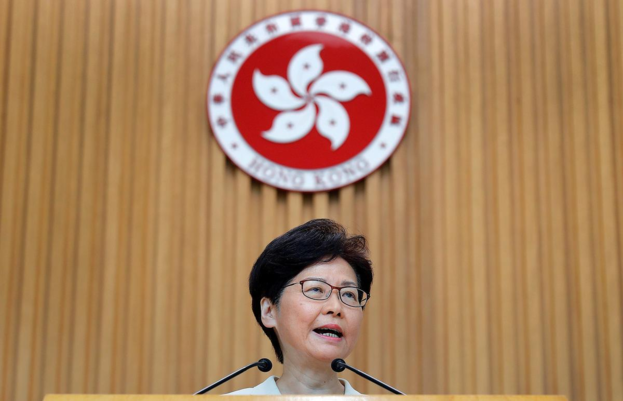Input 2021.02.25 10:50 | Revision 2021.02.25 10:52
Hong Kong public officials currently pledge their allegiance to comply with the Hong Kong Basic Law, which is the’mini-constitution’ of Hong Kong, when taking office under the Hong Kong Security Act, which took effect on June 30, last year. .
‘Non-patriotic acts’ contrary to the pledge of loyalty are not only acts that claim Hong Kong independence or violate the Hong Kong Security Law, but also’acts that harm the entire interests of Hong Kong’ and’budget bills and bills submitted by the Hong Kong government. Indiscriminate objections to Korea’ are also included. The target of the oath of loyalty has also been expanded from the existing administrative ministers, legislative members, judges, and senior executive officers to ward councilors.

The pan-democracy camp, opposition to Hong Kong, rebelled fiercely. “The amendment is to drive all pan-democracy camps out of the parliament,” said Rep. Cheong Tae-Hung, saying, “The government is trying to completely change the rules of the game.” The Hong Kong daily newspaper Myungbo said, “Some lawmakers said they would not pledge their allegiance.”
Hong Kong intellectuals also expressed concern. It is pointed out that it is ambiguous about how the government will define patriotism and how to evaluate it. Professor Zhang Da-ming of Hong Kong University said, “The amendment is not a legal language, but a political language. The amendment is not a legal language but a political language. For this reason, the principle of presumption of innocence cannot be applied.”
“A patriot can be legally defined in a political sense,” said Ronnie Tong, a member of the administrative board’s advisory body, Carrie Ram’s advisory body. “A patriot who successfully fulfills the pledge of loyalty is a patriot, and those who do not are a patriot.” did. According to the government announcement, the executive minister or an official appointed by the executive minister presides over the pledge of loyalty and can judge the truthfulness of the pledge.

Some observers say that the Chinese government will eliminate or drastically reduce the electoral group of the district council, which decides the election of the Hong Kong administrative minister at both meetings next month (the National People’s Congress and the China People’s Political Consultation).
As it was, the 117 seats of the electoral team will be transferred to the pan-democratic camp that won the 2019 district council elections according to the winner-take-all method. However, it is an analysis that the Chinese government will intervene in any form in the future as it is contrary to China’s position that’patriots rule Hong Kong’.
On the 22nd, Shabaorung, head of the Hong Kong-Macao Office of the Chinese State Council, who is in charge of the Chinese government’s Hong Kong, hinted at reform of the system, saying, “We need to hurry to improve the (Hong Kong) election system.” did. The Hong Kong South China Morning Post (SCMP) quoted a source on the 24th and reported, “It is still in the process of listening to opinions, but the Chinese government is putting weight on the whole of the Hong Kong election system.”

The first step, Mr. Borrell said, “includes measures to expand support for civil society in Hong Kong, including cooperation with appropriate institutions and political parties.” The second step was to be taken in case the situation worsens, such as if Hong Kong’s judicial independence is undermined or the electoral system is aggressively reformed.
It is highly likely that China will not mind pressure from the international community. Even when the Hong Kong Security Law was enacted last year, China passed the bill in both meetings, ignoring opposition from Western countries including the United States. The Hong Kong Security Law, consisting of 6 chapters, 66 articles, and 9800 characters in total, including general rules, defines the so-called “four crimes” that harm Hong Kong’s national security as △separated independence △overturned the system △terrorism △foreign tax collusion. If they lead’join, conspiracy or practice’ through’violence or other means’, they can be punished from a minimum of 10 years to life in prison, and even a simple participant can be sentenced to a maximum of 3 years in prison.
China also established the National Security Agency (NSO), a Hong Kong security law enforcement agency last year. The NSO collects and analyzes information related to national security in Hong Kong and handles related cases directly. Measures may be taken to strengthen the management of foreign government agencies, international organizations, foreign non-governmental organizations (NGOs) and the media in Hong Kong. However, it is not subject to Hong Kong law, and the Hong Kong government is not allowed to cooperate in their activities and interfere with their work.

Chinese media have argued that the Hong Kong police have maintained British-style training and that change is necessary. China’s state-run Global Times reported on the 24th that the British-style ritual training of the Hong Kong police was called “colonial heritage” and “it will change gradually”.
